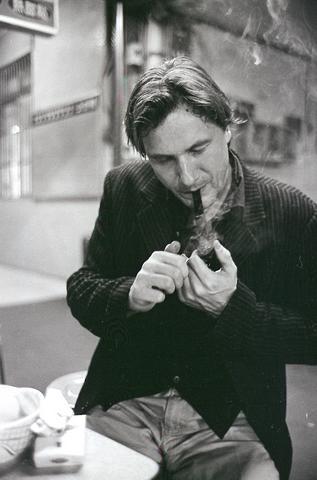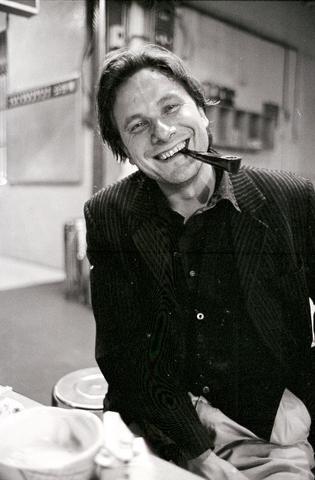At a theater on Taipei's west side, a set piece is being broken down and hauled out to make way for the next production. A couple of stagehands discuss what they'll need for the show, crunching wood shavings underfoot.
It's a scene played out at theaters the world over, but the stage at this theater is among the world's smallest, and its actors -- the ones the audience sees, at least -- are made of wood. It's TTT Puppet Theater (大稻埕偶戲館) and it's the sole puppet theater in a district that once had 10 such venues.

PHOTO COURTESY OF NATALIE FALGARONE
Presiding over the company of puppeteers, wood carvers and lighting and costume designers is Robin Ruizendaal, an 11-year resident of Taiwan and a paradox of a local personality. Though a man holding a puppet isn't often taken seriously, Ruizendaal also holds a wealth of knowledge on Chinese and Taiwanese culture, gleaned from years of research in sinology.

PHOTO COURTESY OF NATALIE FALGARONE
Ruizendaal first began learning Mandarin at 19 and continued his studies at Holland's Leiden University. In the early 1980s, he began research on his doctoral dissertation on Chinese marionette theater. It was a topic that would gain him a kind of access to Chinese culture that few researchers before him had enjoyed.
"I thought [puppet theater] was a nice window to research Chinese society because it's not upper-class culture, it's grassroots culture," he said.
"At the time China was very closed. We didn't know anything about what was happening in the countryside. I thought it was a really interesting, very localized form of art through which I could observe society, because it's related to religion, social groups, theatre, language, music. It had many elements which interested me."
In China, his research followed people associated with the art form from the Republican period in the 1920s, through the Cultural Revolution and up to the 1990s. Among his several observations, Ruizendaal said he learned that the politics of the Chinese Communist Party and the Chinese Nationalist Party were actually very similar.
"The destruction of Chinese religion was high in the priorities of both parties," he said. "I observed China as a religious state where everything is related to religion; everybody lives from house altar to neighborhood altars to temples. What the Communists were doing, as well as the Kuomintang was trying to destroy that element of Chinese culture."
The Communists succeeded in the cities, Ruizendaal said, razing hundreds of temples in Beijing alone.
"But in the countryside where I worked you see the tenacity of religious structure, which was interlinked with social culture so strong that it made an enormous rebound."
"The same thing is happening in Communist China now as happened in Taiwan, with the government initially against theater, banning it for several reasons. ... But in the 1990s there was this turnaround where Communist cadres started supporting theater as a local art, trying to make it function outside the state system."
Was it allowed to be as bawdy an entertainment as it previously had been?
"Yes. You can't get away from sex and shit," he laughs. "Without them, nobody would come."
But Ruizendaal considers Taiwanese puppet culture special compared with its counterparts in China or Japan or other parts of Asia in that it's been popularized in the media.
"Starting in the 1970s, there was an enormous craze for puppet theater -- televised puppet theater -- and so it's really part of the heritage of people in their 40s, 50s and 60s. They all have a warm feeling for puppet theater even though they don't watch it anymore."
The craze continues today, Ruizendaal said, with televised puppet shows and Web sites dedicated to puppets that provide information on each character's biography and birth sign, even their blood type.
"It goes far -- especially among university students," Ruizendaal said.
"It's one of the only forms of art that didn't come from China or Japan or the US. The traditional small puppets come from China, but the big puppets, with their specific Taiwanese lingo, they're a purely Taiwanese art."
And so Ruizendaal's job is as much popularization of puppetry as it is preservation. His main tasks, he explains, are making new plays based on traditional ones, creating a new audience for live puppet theater and promoting it abroad.
TTT works closely with theaters in Cambodia, Myanmar, Indonesia and India.
Last year they toured 12 countries. This year they'll take in five countries, including a second appearance at London's Victoria and Albert Museum.
Despite the considerable attention he's received in local media for his work, Ruizendaal doesn't find it strange that the task of preserving a uniquely Taiwanese art form has fallen to a foreigner.
"I think that, in a global perspective -- in the world of the arts, at least -- the concept of `foreigner' is changing a bit. Maybe not for bus drivers ... but in the arts it's getting quite normal to have conductors from Japan working in Europe. Puppetry is just on the periphery of the arts."
TTT Puppet Theater's upcoming shadow puppet production, The Child in the Rice Paddy (

Climate change, political headwinds and diverging market dynamics around the world have pushed coffee prices to fresh records, jacking up the cost of your everyday brew or a barista’s signature macchiato. While the current hot streak may calm down in the coming months, experts and industry insiders expect volatility will remain the watchword, giving little visibility for producers — two-thirds of whom farm parcels of less than one hectare. METEORIC RISE The price of arabica beans listed in New York surged by 90 percent last year, smashing on Dec. 10 a record dating from 1977 — US$3.48 per pound. Robusta prices have

The resignation of Taiwan People’s Party (TPP) co-founder Ko Wen-je (柯文哲) as party chair on Jan. 1 has led to an interesting battle between two leading party figures, Huang Kuo-chang (黃國昌) and Tsai Pi-ru (蔡壁如). For years the party has been a one-man show, but with Ko being held incommunicado while on trial for corruption, the new chair’s leadership could be make or break for the young party. Not only are the two very different in style, their backgrounds are very different. Tsai is a co-founder of the TPP and has been with Ko from the very beginning. Huang has

A few years ago, getting a visa to visit China was a “ball ache,” says Kate Murray. The Australian was going for a four-day trade show, but the visa required a formal invitation from the organizers and what felt like “a thousand forms.” “They wanted so many details about your life and personal life,” she tells the Guardian. “The paperwork was bonkers.” But were she to go back again now, Murray could just jump on the plane. Australians are among citizens of almost 40 countries for which China now waives visas for business, tourism or family visits for up to four weeks. It’s

Beyonce on Sunday finally won the Grammy for the year’s best album for her culture-shaking Cowboy Carter, as rapper Kendrick Lamar posted a clean sweep on a night that served as a love letter to fire-ravaged Los Angeles. Chappell Roan, Charli XCX, Doechii and Sabrina Carpenter emerged as big winners at the performance-heavy gala, while heavyweights Taylor Swift and Billie Eilish went home empty-handed. Beyonce’s win for Cowboy Carter now makes her the most nominated, most decorated artist at the awards show ever — as well as the first Black woman to claim the top prize in this century. The triumph was all